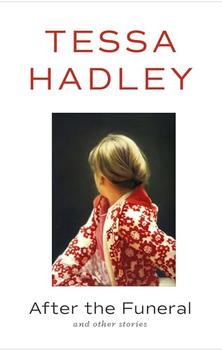Summary | Excerpt | Reviews | Beyond the Book | Readalikes | Genres & Themes | Author Bio

After the Funeral
After the funeral, the two little girls, aged nine and seven, accompanied their grief-stricken mother home. Naturally they were grief-stricken also; but then again, they hadn't known their father very well, and hadn't enormously liked him. He was an airline pilot, and they'd preferred it when he was away working; being alert little girls, they'd picked up intimations that he preferred it too. This was in the nineteen-seventies, when air travel was still supposed to be glamorous. Philip Lyons had flown 747s across the Atlantic for BOAC, until he died of a heart attack—luckily not while he was in the air but on the ground, prosaically eating breakfast in a New York hotel room. The airline had flown him home free of charge.
All the girls' concentration was on their mother, Marlene, who couldn't cope. Throughout the funeral service she didn't even cry; she was numb, huddled in her black Persian-lamb coat, petite and soft and pretty in dark glasses, with muzzy liquorice-brown hair and red Sugar Date lipstick. Her daughters suspected that she had a very unclear idea of what was going on. It was January, and a patchy sprinkling of snow lay over the stone-cold ground and the graves, in a bleak impersonal cemetery in the Thames Valley. Marlene had apparently never been to a funeral before; the girls hadn't either, but they picked things up quickly. They had known already from television, for instance, that their mother ought to wear dark glasses to the graveside, and they'd hunted for sunglasses in the chest of drawers in her bedroom: which was suddenly their terrain now, liberated from the possibility of their father's arriving home ever again. Lulu had bounced on the peach candlewick bedspread while Charlotte went through the drawers. During the various fascinating stages of the funeral ceremony, the girls were aware of their mother peering surreptitiously around, unable to break with her old habit of expecting Philip to arrive, to get her out of this. —Your father will be here soon, she used to warn them, vaguely and helplessly, when they were running riot, screaming and hurtling around the bungalow in some game or other.
The reception after the funeral was to be at their nanna's place, Philip's mother's. Charlotte could read the desperate pleading in Marlene's eyes, fixed on her now, from behind the dark lenses. —Oh no, I can't, Marlene said to her older daughter quickly, furtively. —I can't meet all those people.
So Charlotte took charge, arranging with the funeral director, who was willing to give them a lift home in his hearse, and then breaking the news to Nanna, who was affronted but couldn't be surprised by any new revelation of Marlene's inadequacy. Nanna was a tall, straight-backed widow whose white hair was cut sensibly short. She collected old delft and read all the new novels and taught piano: only not to Lulu, who had wriggled and slid down off the piano stool, wanting to press the pedals with her hands. Charlotte practised religiously but wasn't musical, her nanna said. Of course Nanna was grieving too, for her youngest son. Her other sons were a doctor and a dentist, and although she used to talk deprecatingly about Philip's flying, as if it were something rash, like running away to join a circus or a pop group, the girls understood now that this meant he'd been her favourite. Nanna had lost her baby boy and was inconsolable, like a tragic actress in a film. Charlotte and Lulu looked volumes at each other.
At home they fussed around Marlene, who submitted limply to their ministrations; they kissed her and took off admiringly, piece by piece, in reverse order, all the items they'd dressed her in for the day's drama: sunglasses, black chiffon headscarf, royal blue gloves because she didn't possess black, high-heeled black patent-leather slingbacks. The beloved Persian lamb they enveloped again tenderly in its clinging polythene. Then they sat her down on the sofa in front of the television and turned on the children's programmes; Lulu, pressing up against her, stroked her left hand with its wedding ring, which shone with a sober new significance. Charlotte, feeling grown-up, boiled the kettle and made tea in the pot for them all, stirring two teaspoons of sugar into each mug, and a not extravagant dollop of whisky from the bottle, plus extra milk in Lulu's. She got out the biscuit barrel from where it was supposed to be hidden in a high cupboard, by standing on a stool, as usual. Marlene couldn't reach the high cupboard, either, without using the stool. They ate a lot of biscuits and Charlotte made toast under the grill, with its real flames.
Excerpted from After the Funeral and Other Stories by Tessa Hadley. Copyright © 2023 by Tessa Hadley. Excerpted by permission of Knopf. All rights reserved. No part of this excerpt may be reproduced or reprinted without permission in writing from the publisher.
The low brow and the high brow
Click Here to find out who said this, as well as discovering other famous literary quotes!
Your guide toexceptional books
BookBrowse seeks out and recommends the best in contemporary fiction and nonfiction—books that not only engage and entertain but also deepen our understanding of ourselves and the world around us.